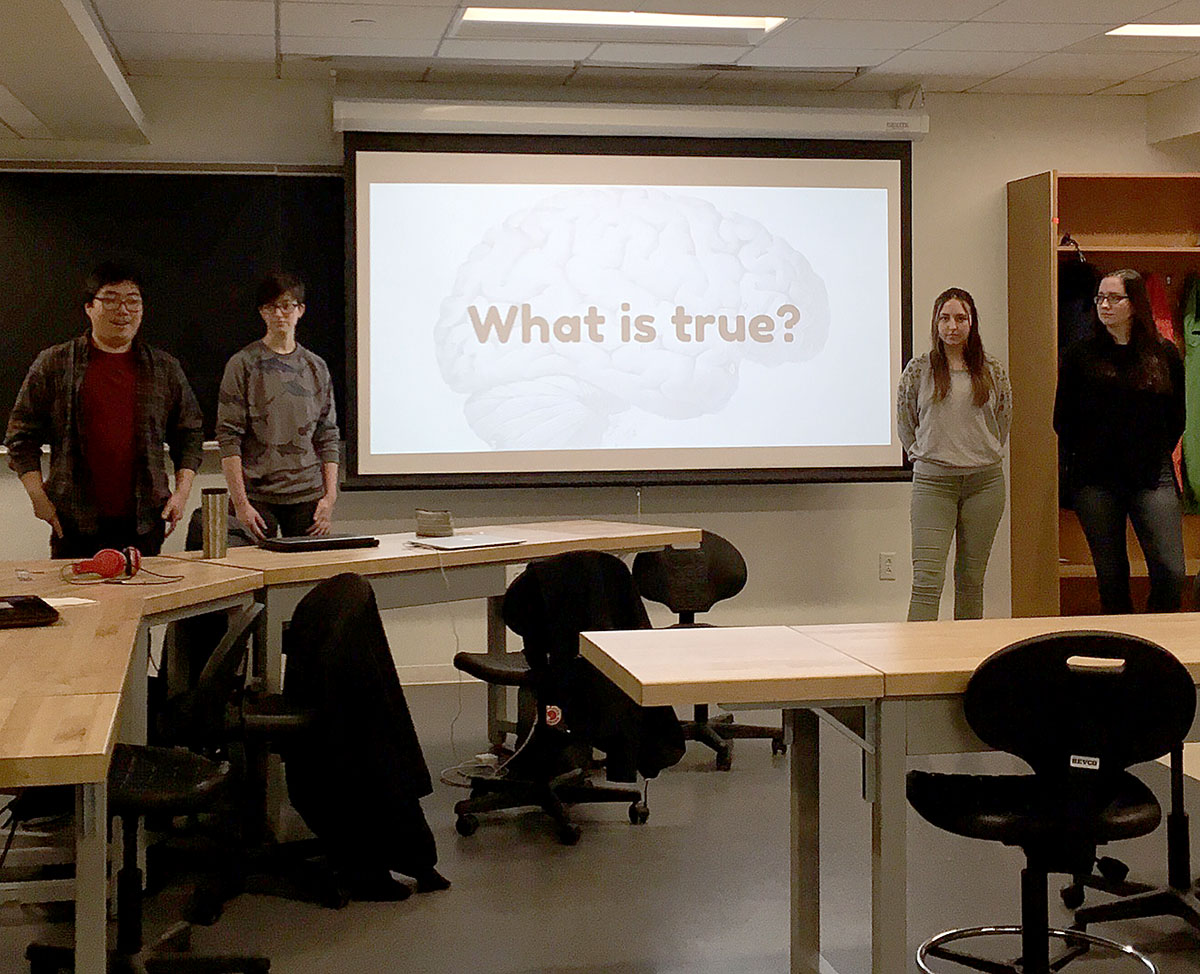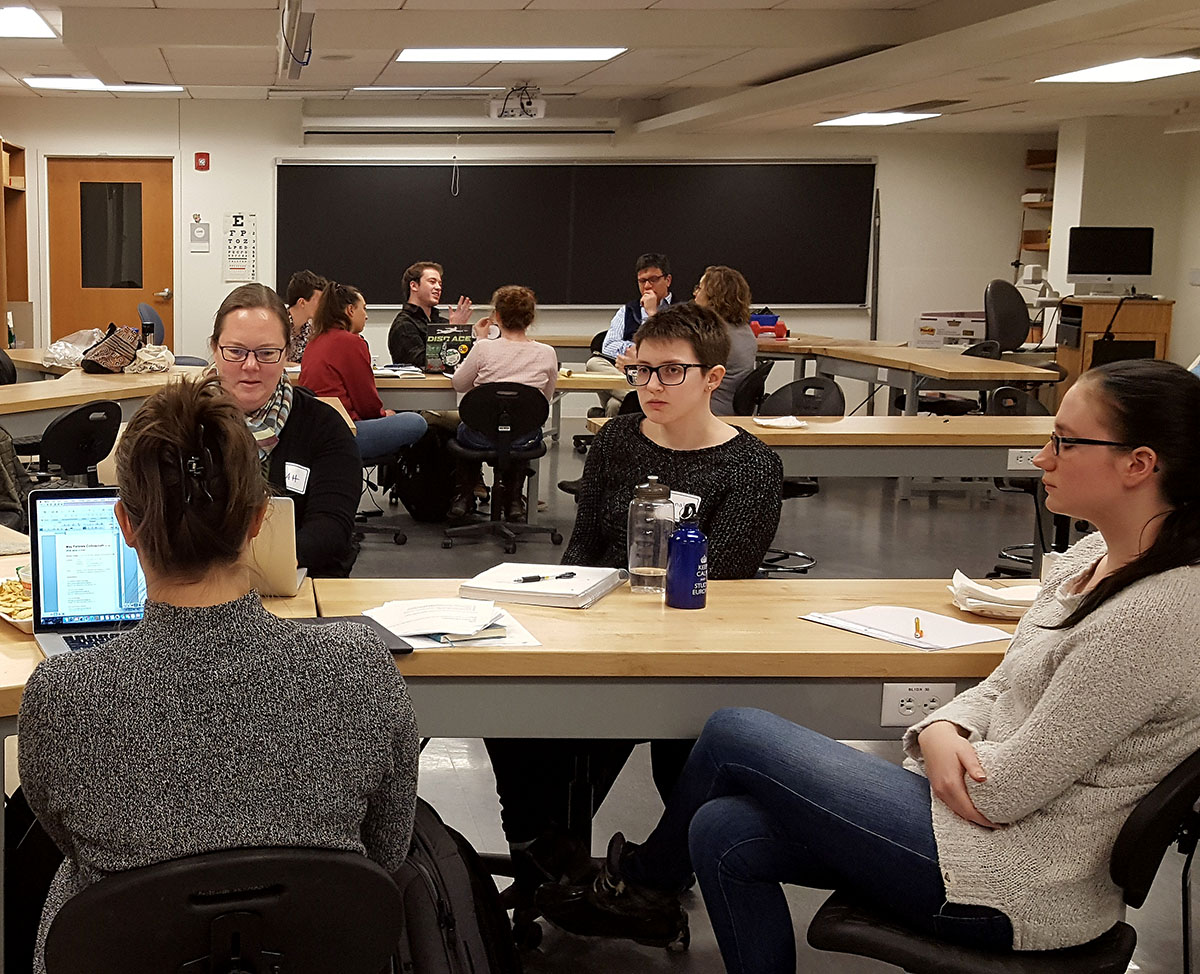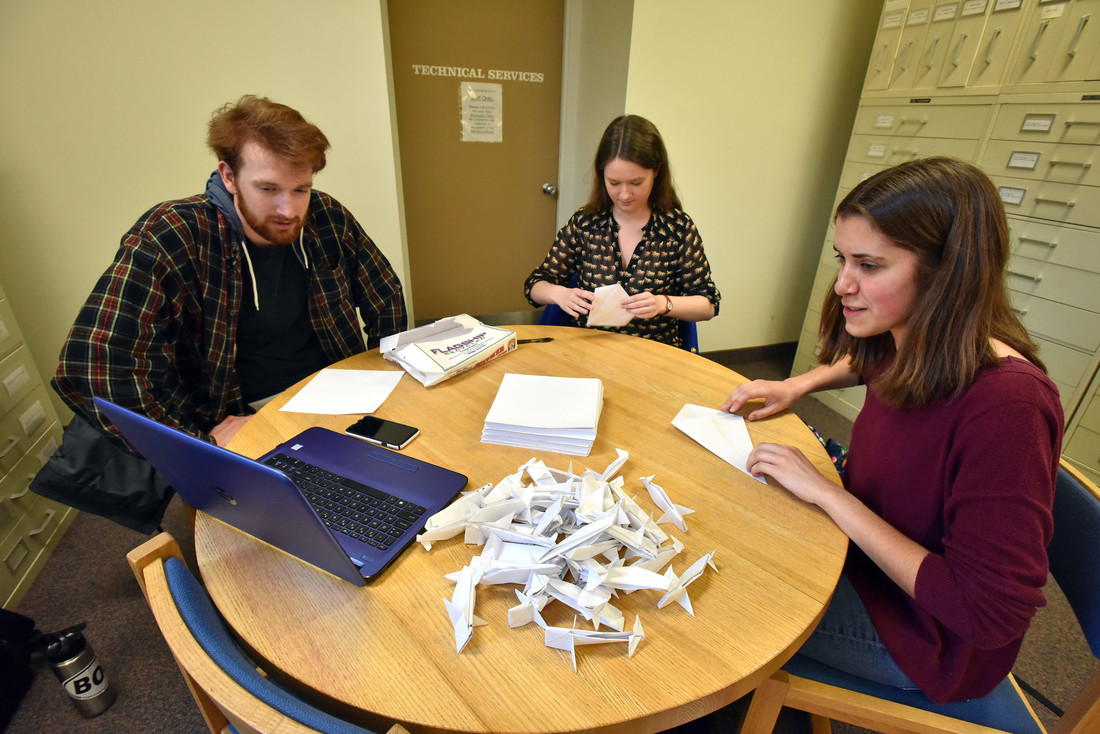Contemplating truth over winter break

May Fellows tackle timely question in second year of colloquium
There are many ways for students to spend the weeks between New Year’s and the start of spring classes: relaxing, working internships or part-time jobs, practicing a sport. Twelve May Fellows chose to stay on campus, grappling with the question “What is true?”
It was the second iteration of the May Fellows Colloquium, a program piloted last year around the issue of global climate change. The intensive, research-based experience, open through an application process to the college’s 200 May Fellows, provides an opportunity for students to use their winter break productively—gaining a full academic credit while acquiring professional skills, working closely with faculty and producing an impactful final project.
The colloquium got its start after several May Fellows expressed interest in a program that would help stimulate intellectual thought and activity over break, said Dean of Advising and Academic Success Steven Viveiros, a May Fellows advisor. Assistant Professor of Art Kelly Goff, previous faculty advisor to the May Fellows, proposed this research and project-based learning experience.
Finding a topic
Assistant Professor of Political Science Aubrey Westfall has served as a faculty mentor both years and said, when searching for a topic this year, she wanted something that would deal with concrete social problems but also be subject to interpretation.
“The topics came from my own grappling with what’s been going on in our political sphere—we’re presented with facts, or what seem to be facts, yet people can deny or reframe the facts in such a way that huge segments of the population are persuaded to see things differently,” Westfall said. “I was a philosophy undergraduate major, so I am interested in the epistemological questions, too, such as how can we ever know truth, what does it mean to know truth, and how do we know we know truth?”
She brought the topic to May Fellows mentors Kate McCaffrey, Courtney Ruggles and Viveiros, and the May Fellows student advisory board, and they approved it.

The students did some reading before returning to campus, then kicked off the program with a workshop, where faculty members in art history, chemistry, German studies and psychology spoke about what truth means in their disciplines.
“Even in that one day you could see such wide and varying interpretations in what truth means or how to know if something’s true or how you arrive at the truth,” Westfall said. “It was really fun and intellectually engaging for those of us who participated.”
Three approaches to truth
Split into three groups, the students came up with projects that would explore the concept of truth. Faculty mentors John Partridge, Kate Eskine, Jenni Lanni and Westfall provided feedback and support throughout the program, and through the semester as the groups continue to work on their projects.
Hannah Merseal ’19, a double major in music and psychology, worked on a project that examined the dynamic between a controversial artist and perceptions of the artist’s work.
“This issue has recently become highly public via the #metoo movement, but has actually been a large part of history in all art fields, including music, visual arts and theater. We wanted to explore to what degree the truth of an artist can taint the truth of their art, and whether we as an audience have a responsibility or even ability to decide whether to separate them,” Merseal said.
Her group is developing a research paper, experiment and exhibition of controversial artists that they plan to unveil at the May Fellows “welcome back” event on February 18.
Political science major Kaitlyn Megathlin ’20 participated in the colloquium in 2017 as well as this winter. Her group is doing an institutional review of intergroup dialogue at Wheaton.
“We found through research that there is this pattern on college campuses, especially ones that are so small, that some groups feel like they are ‘silenced,’ in the sense that they don’t feel like they can share their mission or that the greater campus isn’t going to be receptive to their message. This is an issue because when people are silenced it means that some of the truths that present in the world aren’t being shared,” Megathlin said.
The May Fellows interviewed Wheaton staff and student leaders and are using that information to make recommendations for improving communication on campus.
“We understand that the study that we did over two weeks is not complete and, because it was break, we weren’t able to talk to as many student leaders as we wanted, but we definitely saw a pattern,” Megathlin said. “We are hoping our project will bring awareness to the problem.”
Developing a curriculum

The 2017 May Fellows Colloquium focused on the topic of climate change and was led by faculty mentors Barbara Darling-Smith, Goff, Jason Goodman and Westfall. Megathlin’s group developed a curriculum around the science of climate change, which they then taught at a local middle school as a pilot program.
“Each year you learn a new set of skills,” Megathlin said of the colloquium. “Last year I learned a lot about how to teach and in turn how to keep people interested while still making sure I get all the necessary information across. This year, given the nature of the project, I learned a lot more about how to interview individuals and then analyze that information. I’ve learned how to think critically when looking at a bigger institution and then find ways to try and make it better.”
The other group that participated in the pilot year of the colloquium crafted an art exhibition that featured an endangered species and developed proposals they sent to local museums.
First-year student Jonathan Raymond ’21, undeclared but considering a major in international relations, said the colloquium was one of the main reasons he joined the May Fellows.
“The entire concept of getting to work on some serious, and also practical, research project really interested me,” Raymond said. “Our project was about reducing mental health stigma on college campuses. We focused on creating a curriculum, kind of like Safe Zone, except about raising awareness and education about mental health and illness.”
Westfall said the May Fellows Colloquium teaches students numerous skills, including how to develop research methodology, engage with focus groups, conduct interviews, analyze content and write well.
“We treat students like researchers and colleagues, so they go through a process of recovering from criticism and moving forward with their project in a super accelerated time frame,” Westfall said. “I think they’re really intellectually courageous to take this on.”
